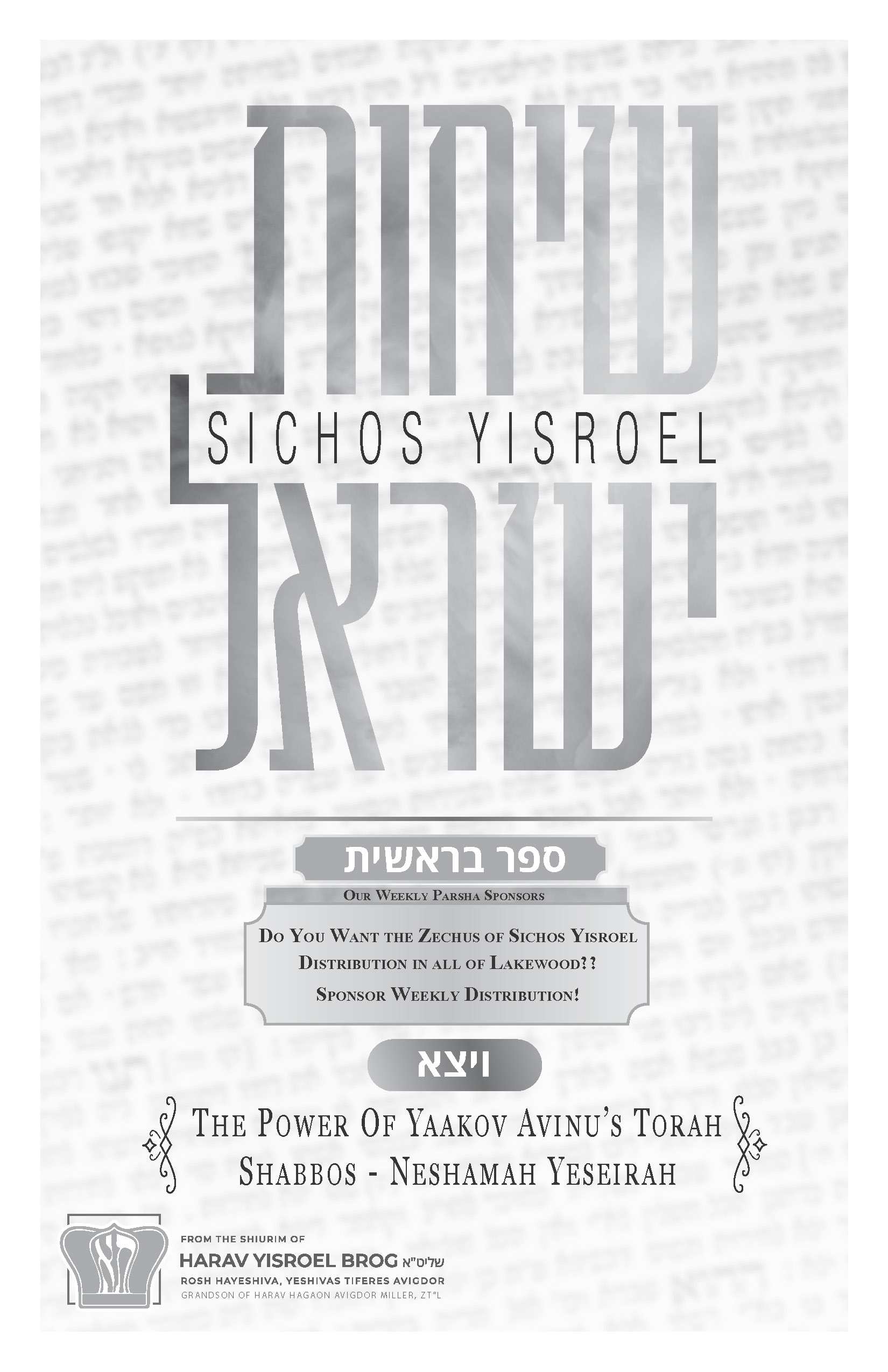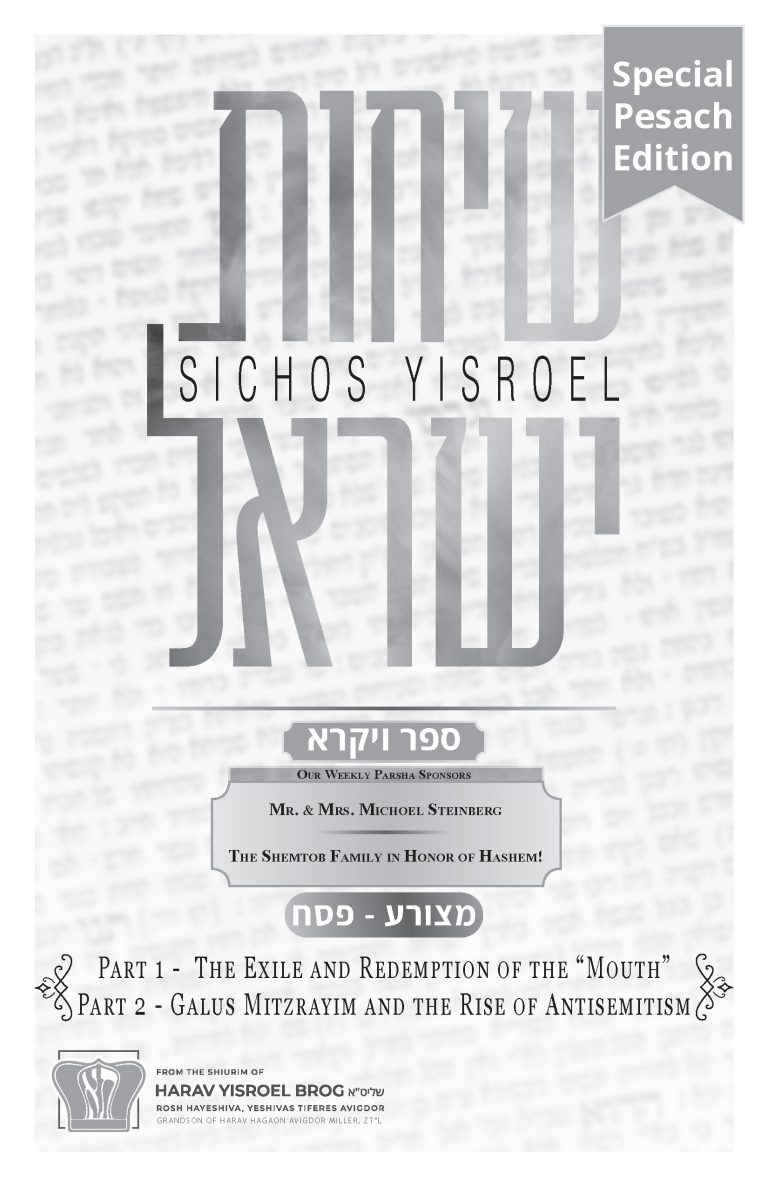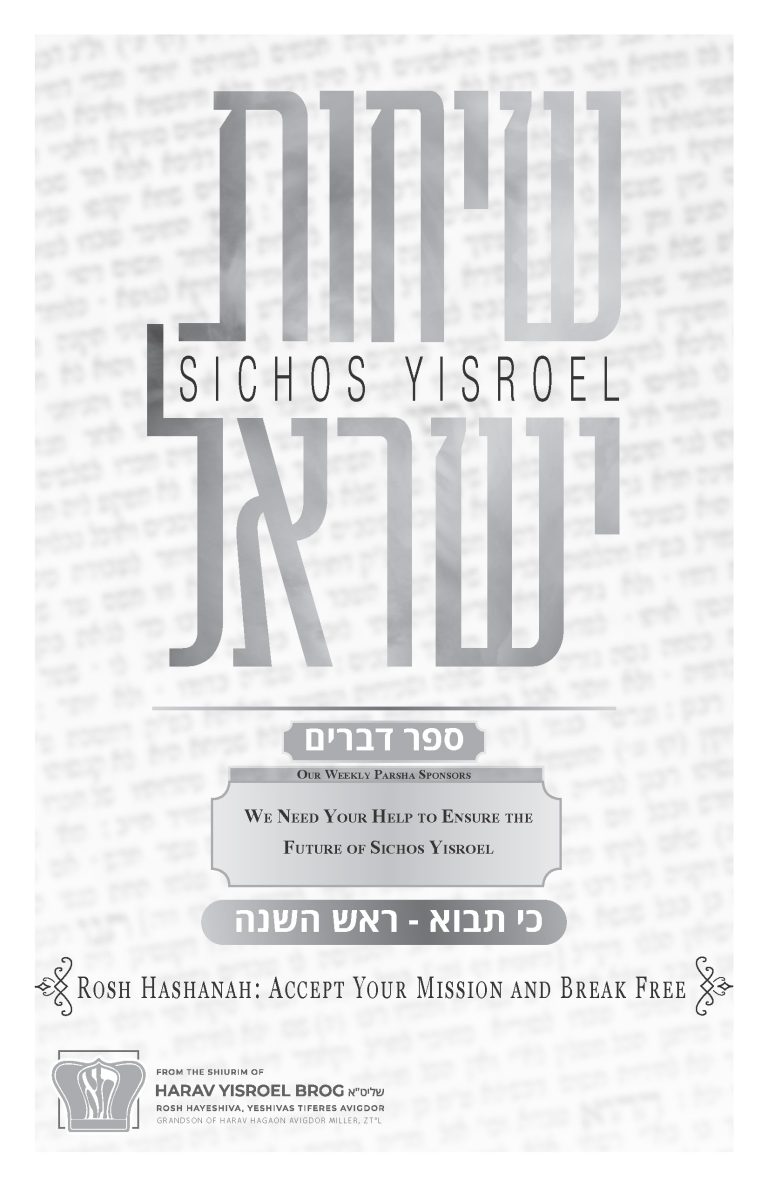Vayeitzei 5785: The Power Of Yaakov Avinu’s Torah
Sponsored
Do You Want the Zechus of Sichos Yisroel Distribution in all of Lakewood??
Sponsor Weekly Distribution!
Consider sponsoring a shiur
Visit YTATorah.org
Shiurim given in 5781 and 5771
- Part 1: The Power Of Yaakov Avinu’s Torah
- Part 2: Neshamah Yeseirah
The Power Of Yaakov Avinu’s Torah
Yaakov’s Learning: Focus Amidst Distraction
In this week’s parshah, the Torah tells us about Yaakov Avinu, who found himself in double jeopardy. Number one, he hadn’t yet gotten married. He was no youngster anymore. He was in his sixties. So he was an older gentleman already and he was not married. His father had gotten married at the age of 40. So Yaakov Avinu was way over the top. That was one situation he was facing. The second challenge that he was facing, at this not-so-young age, was that he was a marked man. His brother Eisav was out to nail him. He had a clear bullseye on his back. And when Eisav made plans to eliminate somebody, he was usually successful. And now Yaakov leaves: ויצא יעקב מבאר שבע, “and Yakov left Ber Sheva” (Bereishis 28:10). The Torah tells us that he was now heading toward Charan, and it came to be through a roundabout route that he ended up in the place of the Beis Hamikdash. He decided, or he was encouraged by Hashem, to lay down there and go to sleep. The lashon of Chazal is that Hashem said, “Is it possible that this great tzaddik comes to My home and he’s not going to spend the night?” So Hashem arranged for the sun to set in the middle of the day. It’s astounding that Hashem went to such lengths to orchestrate that Yaakov sleep in the place of the Beis Hamikdash! He could have made him tired, He could have made him droopy or some other thing, without energy. And he had good reason to be tired. But Hashem went out of His way to pashut make the sun set early, which is just mind-boggling.
The passuk says וישכב במקום ההוא, “and he laid down at that place” (Bereishis 28:11). Rashi says that the pasuk does not simply say that he laid down “in the place” but it says he laid down in “that place,” which is an extra word. It’s superfluous. So Rashi tells us that the reason the pasuk was written in this fashion is to reveal that during the previous fourteen years, when Yaakov was in the yeshiva of בית עבר, he didn’t lay down at night because he was being oseik in Torah. Now, just to give you a little bit of a timeline. We just mentioned that Yaakov was a marked man: Eisav wanted to kill him. He was already up in years, and he also needed a shidduch. And he takes a detour and decides to go to learn for fourteen years?! That is very difficult to comprehend. That’s mind-blowing. My Rebbi (Rav Meir Halevi Soloveichik) wanted to know why did the Torah have to teach us this? Why did Hashem want to teach us this piece of information? Why is it relevant at this juncture in time to know that Yaakov Avinu did not sleep for the previous fourteen years? It should have said, “the sun set suddenly, and he lay down, and went to sleep.” Why does it have to tell us that for the previous fourteen years, he didn’t lay down even once? That is some amazing piece of information. I don’t think we could imagine that somebody should not sleep for fourteen years! Maybe Shavuos night you stay up, barely. Then you sleep for days afterward to make up for it. We heard of people missing a night of sleep traveling on a plane and getting jet-lagged, and then trying to catch up for who knows how many days. But fourteen years not to lay down?! Now, it doesn’t say he never closed his eyes, but he never laid down in bed.
What was the reason that Hashem had to tell me this now? And what is the connection between the fact that he didn’t lay down for fourteen years and that now he laid down? Perforce, my Rebbi said, it must be that the previous fourteen years of not sleeping were related to the fact that he slept that night, and it’s related to what happened that night.
The Vision in The Makom Hamikdash
On that night, Yaakov Avinu had a vision the likes of which we cannot imagine. Hashem revealed to Yaakov, like the Ramban says, how Hashem employs angels and directs the angels to do and take care of all the nations of the world, every individual human being, and every creation in the world. And He showed him how Hakadosh Baruch Hu is on a ladder and promised Yaakov Avinu a tremendous promise. And that is, that he will not be directed through the hands of the angels, but rather it’s going to be ‘כי חלק ה – he’s going to be directly under Hashem’s control, and Hashem will be with him constantly.[i]
Yaakov Avinu became aware that wherever he will go, and all the nations of the world – the main four powerful nations in the world – will challenge Yaakov’s descendants in the future, and that Hashem will be with Yaakov’s descendants and Hashem will go with them and will ultimately be shomer them, and be matzil them. And that all the nations of the world will be directed by angels. And you want to know why Yaakov Avinu was zoche to this? It was because for fourteen years, he didn’t sleep, and was oseik in Torah. Now, let me give you a little bit of an insight into what that means. Sleep is part and parcel of what mortals require. We don’t lie down and go to sleep because of luxuries. It’s not an extra thing that people do. I see people that fall asleep all day long. They take their sleep a little too seriously. But Hashem made it that you’re supposed to fall asleep by night. And by day, you stay up and you work.
Avodas Hashem and Rising Above Nature
Now, how do you define that action of Yaakov Avinu? How would you describe a person who forgoes his sleep for so many years? You know what the peshat is? It’s the highest level of kedushah. It’s the highest level of prishus, the ultimate separation from a mortal human need. A person who could rise above whatever a human being needs, if a person who could forego on sleep and be oseik in Torah, that person has reached the highest levels of kedushah. At the end of Mesillas Yesharim, he talks about the last and the highest level of kedushah. Over there, he mentions this factor. You know why most people can’t stay up? Because they are very far from the highest level kedushah. But a human has the ability to rise above nature and to become, basically, a malach. He could get such control over himself that he’s able to not have what everybody in the world needs, and he could function and he could grow because he’s a kadosh. He becomes elevated over all mankind and he becomes one with Hashem! So because Yaakov rose above man by not sleeping for 14 years – because of his intense learning – that entitles him, that enables him to rise to the point that Hashem deals with him in an unnatural way! That’s why Hashem chose to deal with him not in the usual fashion that Hashem deals with all the people in the world. Hashem deals with Yaakov personally. All the other humans living on earth are not elevating themselves, not rising above themselves. So they remain in this low earthly state. Do you know what you have to do to get into the world of Hashem? You have to get out of the world that you find yourself in!
In order for Hashem to show you higher aspects of His involvement with the world, you have to rise above this earth. It says in many sefarim that if you want to see Eliyahu Hanavi, if you want to be zocheh to have Eliyahu Hanavi come to see you, do you know what you have to do? You have to fast for 40 days. You rise above humanity. So now Hashem will reveal to you bigger revelations. The 14 years of Yaakov’s aliyah would definitely accomplish rising above humanity. There’s a very interesting lashon in the Midrash. It says, נטמן, Yaakov “buried” himself in the Beis Medrash (Rashi on Bereishis 28:9). What happens when you “bury” yourself in something? You cover it up, and you remove it from all its external environments. That’s what happens when you bury yourself. Yaakov Avinu buried himself in that yeshivah in Torah, and removed himself from the world. He rose above Eisav. He rose above his need for shidduchim. And Hashem said, “Because you did that, you are going to be zocheh to this nevuah.” Prophecy is the highest level that a human being could attain in being close to Hashem. And Hashem promised him he was going to give him Eretz Yisrael. He was going to watch him. Hashem was going to guide him wherever he went and whatever he did.
And that’s why the Torah says, וישכב במקום ההוא, “he went to sleep in that place,” in exactly this juncture in time because rising above one’s natural tendencies is the only way to reach the highest of levels. Now, of course, we can’t play this game. It’s not a game. Yaakov Avinu prepared for this for many, many years of intense training, and he was zocheh.
The Neshamah as a Ladder Connecting Heaven and Earth
Now, the emes is that this is stated in a sefer written by someone named Rav Yitzchak Issac Chaver. He was one of the talmidim of the Vilna Gaon.[ii] He revealed some amazing revelations and insights into the depths of the Torah. One of the many sefarim he wrote was called Ohr Torah. He writes there about Yaakov. Yaakov was an outstanding individual who came from the yeshivah of Beis Ever, where he was for fourteen years. He was oseik in Torah. He didn’t taste even the taste of sleep. That’s what he says. And that’s why he merited to sleep in the house of Hashem, in the Beis Hamikdash. Listen to these words. He writes שהוא בעצמו קיום הבריאה, he was the one who was mekayem, who supported and held up the entire universe! He was a sulam, he was a ladder that had its feet on the ground, his neshamah was attached to his guf, but ראשו מגיע השמימה, his head reached Heavens. His body was in this world, but his ראש, which is the headquarters of the person’s neshamah, reached into Heavens.
Yaakov Avinu became the human being who replaced Adam HaRishon. He became the person for whom Hashem created the universe! And that’s why it says: סולם זה סיני (Midrash Rabbah, 68:12). He was shown that he was the center of the world! He was the purpose of the world and everything that was going on around: All the malchim that were in the world were all for him, and he was the one for whom the world was created. And the avodas Hasheim of his descendants, their study of Torah, their mitzvos, etc. was the purpose of creation. Yaakov Avinu became the central figure of the world. That was the story of Yaakov Avinu’s prophecy. This was not just another prophecy. He established the beriah through his learning of Torah.
And the emes is that Rav Chaim Volozhiner, in his sefer Nefesh HaChaim (שער א’ פרק ‘ט) writes that the ראש, the head, is the shoresh of a person. Now, the head of every person and the shoresh of every person, he says, is really in שמים. So the next time you look at yourself, try to imagine that your ראש extends all the way into the heavens and it extends from the heavens all the way down to the ארץ. And that’s the neshamah that every Jew has, that they got directly from the breath of Hashem.
It comes down in the form of a ladder until it comes down and it lodges itself into the guf, the body of a person. And this neshamah affects all the worlds, all the universes, and depending on where a man is holding and where a person is standing, that has an effect on the whole beriah. And when you see a person who learns Torah down here in this world, it enables him to attach himself to Hashem in the highest of the highest places referred to as גנזי מרום. That’s what a person has to know.
The Spiritual Bond Through Torah and Mitzvos
Our kesher, our bond, our relationship with Hashem is such that we have the ability to do avodas Hashem here, to divest ourselves, to detach ourselves from our physical environment, from the world that all the nations of the world have a shaychus to, and elevate ourselves to mamash be attached to Hashem. And this is the power of limud Hatorah, and avodas Hashem. We should not look at it simply as we do learning here. We do avodas Hashem here, and Hashem gives us reward in the next world. Actually, when we do avodas Hashem over here, we are bonding with Hashem, we are connecting and becoming attached to the Ribon shel Olam. We are really becoming attached to ourselves. We are connecting with our source, our shoresh. That’s what we are connecting with.
In the Rambam it says that even though it’s a mitzvah to learn Torah by day and by night, most of a person’s wisdom is learned by night, believe it or not. Therefore, he says, if a person wants to be zocheh to the crown of Torah, he should be very careful with all of his nights, and he should not lose even one of them entirely in sleep, but rather he should deal with תלמוד תורה and דברי חכמה during his nights. Now, the crown of Torah is the highest level of Torah. That was what Yaakov Avinu was zocheh to merit in the zechus of his learning for those fourteen years. So we, on our level, should make sure we learn Torah every night. By night, and surely every day. You should learn Torah יומם ולילה.
That’s why the power of the chatzos kollel where they sit and learn a whole night, every single night, without any vacation, is so great. They learn motzei Shabbos, they learn through bein hazmanim, through the summer, through the winter, through Chanukah, through everything. It’s unbelievable! That’s the power of not losing one night. Others are different. Some chatzos kollels say Tehillim. A lot of the chatzos kollels are simply mini kollelim. Some learn for an hour, some learn for an hour and a half, and some even learn for two hours, but to learn the entire night is very rare.
The kollel that we’re involved in is a kollel that learns without one break. The tenai, the condition to join this kollel is that you learn ברציפות, non-stop. The power of that Torah and the connection those talmidei chachamim have with the Ribono shel Olam is on such a level that that’s the Torah that holds up the world! That’s the Torah that gets Hashem to do things that He wouldn’t ordinarily do.
Hakadosh Baruch Hu should help us reach that level. At least we should value our Torah. When we’re learning, we should learn with intensity, not by falling asleep, neshamah to Hakadosh Baruch Hu while you are engrossed in the learning of Torah.
The Bottom Line
Yaakov left Beer Sheva and headed towards Charan, where he would look for a wife and wait out Eisav’s anger. On the way, he stopped off in the yeshivah of Ever. There he learned Torah for 14 years with such intensity that the Midrash says he ‘buried’ himself in learning Torah, i.e., he removed himself from everything that was going on around him and focused on limud HaTorah. Then he continued on to Charan. However, when he reached the place of the Beis Hamikdash, Hashem caused the sun to set early, and caused Yaakov Avinu to sleep there. The pasuk says, “And he laid down at that place.” The extra word, ההוא, teaches us that Yaakov Avinu lay down there, but did not lie down to sleep for the previous 14 years, rising above normal human behavior. That night, Yaakov Avinu had a vision wherein Hashem told Yaakov that he would be directly under Hashem’s control and Hashem would be with him constantly. This kesher came as a result of Yaakov Avinu reaching the highest levels of kedushah. Through his avodah of intense learning, he became the person for whom Hashem created the universe, and the avodas Hashem of Yaakov and his descendants became the purpose of the world and the foundation of the entire creation. When we learn Torah and do avodas Hashem it elevates our neshamos; we detach ourselves from our physical environment and elevate ourselves to be attached to Hashem in the highest places. We can learn a practical lesson from Yaakov Avinu and earn the crown of Torah by being sure to never let a whole night pass without learning some Torah. This week I will (bli neder), practice valuing the Torah I learn and I will encourage myself while I am learning, (1) to learn with intensity, (2) not to fall asleep, (3) to be involved, and (4) think about the connection of my neshamah to Hakadosh Baruch Hu.
Shabbos: Neshamah Yeseirah (5771)
We’re going to explain today a little bit about the neshamah yeseirah.
On Shabbos, there is a change in the briah, but that change is not only in the briah. That change transpires within the nefesh and the neshamah of every single Jewish person in a personal way. Every one of us is mekabel a tosfos neshamah into ourselves.
Of course, not everybody gets the same amount of tosfos. Everyone gets it according to where he’s holding. If a person wasn’t meichin himself for Shabbos and didn’t become a keili for the neshamah yeseirah, there is nowhere in that person for the neshamah yeseirah to be chal.
The Rashba explains that Hakadosh Baruch Hu bequeaths of Himself, Hashem takes of His atzmius and transforms the world from a place called olam, which means hidden, to something where Hashem’s Presence is more revealed and recognizable.
And this is what the neshamah yeseirah is.
We once learned through a shtickel Ohr Hachaim in Ki Sisa that says: ביום שבת באה נשמה יתירה לישראל, like it says in the passuk, שבת וינפש. And he writes that this is a sod ne’elam, a hidden secret, that Hakadosh Baruch Hu was not megaleh to the umos ha’olam.[iii]
A Piece of Hashem in Us
Now, the reason why it’s called neshamah yeseirah involves the understanding of our neshamah as not simply a nefesh chayah. Even the umos ha’olam contain a nefesh chayah. They have what is called a soul. But there is something unique to Klal Yisrael, who have a nefesh Eloka mima’al, which means that Hakadosh Baruch Hu actually took of Himself and implanted a shtick of Himself into us. He didn’t simply create us. The world is made up of creations of Hakadosh Baruch Hu, but we are not simply creations. Every Yid is a shtick of Eloka mima’al.
A person thinks I’m a mortal like everybody else. So okay, maybe I have another few drops of chelek Eloka mima’al. It’s much more than a few drops.
R’ Chaim Volozhiner explains that a person is much more chelek Eloka mima’al than he is a guf. That is why we are referred – the relationship between one’s guf to one’s neshamah is the relationship of the shoe to a body. The shoe is not something that covers most of the body. Chelek katan me’od.
A person has to know that be’etzem, his essence is a chelek Eloka mima’al that extends משמים ממעל עד הארץ מתחת and is a part of our neshamah in ourselves.
Now, our ma’asim all week long either enable us or hinder our ability to connect to and feel that neshamah. Someone who is osek in devarim ruchniyim, someone who keeps the shearim, the hatches, open – as R’ Chaim Voloziner puts it – attaches himself to his neshamah and feels the connection with lebedikeit. But if a person is choteh, specifically lemashal bemachshavah, then in order for his neshamah not to get shmutzik, a safety hatch gets engaged and becomes locked, and then he feels no spirituality.
True Spirituality
Sometimes you meet a person and ask them how they feel, and they say, “I feel no spirituality whatsoever.” Many times, I have met yeshivah bachurim, and I say, “Have you ever felt ruchniyus?” They say, “No.” I say, “You should know, that is very telling.” They say, “No, some people are just emotional and some people are not.” I say, “It’s not an emotion.” Emotional people think they are experiencing spirituality. That’s not spirituality. That’s emotionalism, it’s a naarishkeit. And the raya is, it’s not moshech them to do the ratzon Hashem.
When I feel a kesher to somebody, I am drawn to that person. If I feel a kesher with my parents, I want to call them, I want to find out how they are doing. If I feel a kesher to my rebbi, I want to call him, I want to hear something from him. I want to know how he is feeling, how he’s doing, how is his mishpachah.
A person who feels a kesher to the Ribono Shel Olam, if he gets in touch with his spirituality, he now wants to learn more, he wants to daven more. He doesn’t want to go into the woods and pick flowers or go bathing in the ocean, or ride a horse. As one person once told me, when he gets spiritual, he likes to ride on a horse on the beach. There are those who told me that they had such experiences, when they have taken different substances, it makes them feel very spiritual. I told them that’s not spiritual. That’s called being under the influence. That’s called nuts. That called you lost your mind. That’s not called spiritual.
Spirituality is when you actually have a meshichah to the Ribono Shel Olam.
A Pull to Hashem, or to Gashmiyus
Now, naturally, a human being has a ratzon to do what’s right, while his guf is always desiring to do what’s wrong. That’s a constant battle and a struggle. A person who is nimshach and opens up the gate for spirituality, that person is nimshach now toward Hashem. He finds it easier to do the ratzon Hashem.
So if a person wakes up in the morning and he doesn’t feel a meshichah, so the first thing he has to do is clear his mind. You know what it means to say? His mind is sullied. That’s what it means. His mind is a shtick shmutz and he has no meshichah to yahadus. Because a person who has a meshichah to yahadus, that’s the first thing he would do – try to clear his mind. Especially if a person is a bachur and he thinks no one knows this. It’s very known. A person’s behavior is very revealing of what’s going on inside. If you see a person who is running after garbage, what are you supposed to think? “Really, he’s a tzaddik, but this moment he decided to go after garbage?” If you see all of a sudden a bunch of flies coming down on a piece of meat, what do you know? You know one thing. There is no fresh meat there. It’s rotten, shmutzige meat. If there are lots of flies, you know it’s tzo’ah gedolah. You know it’s an emese neveilah musrachas. You should know that. It’s a metzius.
So a person all week long has a certain meshichah. You see certain bachurim, and even adults, they have an uncontrollable meshichah to gashmiyus. That’s because they are not in touch with their neshamah. When a person develops more of a shaychus to the neshamah, all of a sudden, it becomes easier. He is more mischashek for ruchniyus. It doesn’t mean to say he doesn’t have a ta’am in gashmiyus anymore. It doesn’t mean he lost his awareness. That takes a long time to lose. But it means to say, I have a ratzon to do this.
The Meshicah on Shabbos
On Shabbos, what happens is, a person’s guf becomes diminished, and Hakadosh Baruch Hu expands his neshamah. And now it’s much easier. You can test if you have any shaychus to Shabbos: if you find it easier to be misgaber on your yetzer haras on Shabbos than on the weekend. I’m not saying you feel like you want to fly, but this is a simple test you can do at home.
We all remember a time when it came Shabbos afternoon, and the last thing that was on your mind was sitting and learning. The cheshek hagadol ve’hanora to sleep was lemaalah min hatevah. That’s how it is. I remember it very clearly. First, you try to play, שינה בשבת תענוג card. Then you try to blame it on the cholent, or whatever else you can blame it on. One thing is for sure; it has to do with pure chumriyus. You are an adam megusham, you are an ish gas, that’s what you are. Because Shabbos – it’s like Yom Kippur.
The Brisker Rav was once asked this question. How come you see freier yidden going to shul Rosh Hashanah and Yom Kippur? They had an Elul?! They heard shmuessen?! They were at a sichas mussar? What did they do? No shaychus to that. Did they hear Shiurei Da’as?! No, of course not. The teretz is, because the frum people become frummer and that creates a hashpa’ah.
You have to know, it’s much easier to sit and learn on Shabbos than it is during the week. During the week, when you have less neshamah yeseirah, there is a much bigger challenge. I don’t care what anybody says. On Shabbos, it’s much, much easier to overcome the yetzer hara. We are not saying there is no yetzer hara. There is a yetzer hara, but it’s easier to overcome it.
Here is a bachur or somebody else, and all he’s doing on Shabbos is investing in his tumah. Like the Chofetz Chaim says, by speaking dibburim assurim, a person is metamei his guf, and his nefesh legamri. And not stam. It is his mouth, he says, that runs the whole system, and the guy is metamei his gantze zich. A person opens up his mouth – boom.
You don’t understand. I’m telling you. Test it. When I became aware of this, I began to make tests. You don’t have to be on a big madreigah to be able to test it. Make an honest test. Can I sit and learn? Ask yourself – most people don’t know themselves. They fool themselves. A lot of bachurim think they can learn three hours straight in seder, in their dreams. The only thing they do three hours straight is sleep. Very few people could have a retzifus of shalosh sha’os if they don’t practice it. Those of you who practiced it got to some retzifus, and those who didn’t practice it, maybe 30 minutes on a good day, without taking breaks. A mentch has to realize that. A person has to know himself. So know yourself. And then see on Shabbos if you committed yourself. Prepare yourself for Shabbos. That’s the first thing. If you are not meichin for Shabbos, it’s not going to work.
And you’ll be shocked to find that on Shabbos, it’s much easier to overcome your yetzer hara than any other time of the week. And yetzer hara bamboozles us into thinking, “Nah, שבת אתה שלי, Shabbos, you’re mine. During the week, I want you to leave your fighting with me.” Not on Shabbos.
Every Jew Becomes a Beis Hamikdash on Shabbos
You have to understand, Shabbos is such an opportunity to form and develop a kesher, a chibur, between Hakadosh Baruch Hu and the world, as a whole, and with Klal Yisrael be’frat. It says in the passuk in relation to Shabbos, לדעת כי אני ה’ מקדשכם (Shemos 31:13). You know what that means, לדעת כי אני ה’ מקדשכם? R’ Tzadok HaKohen explains that it means, “I make you a mikdash.” Every Jew becomes a Beis Hamikdash on Shabbos. That means a person becomes a makom for hashra’as haShechinah. This is the greatest matanah tovah of Shabbos.
And Hakadosh Baruch Hu לא נתתי לגויי הארצות. A goy will try everything. This he can’t have. The mishkan was a keili for hashra’as haShechinah and kedushah in the hearts of people.
That’s what we say, ולא מצא היונה מנוח, as the song we sing, יונה מצאה בו מנוח. The Zohar says, ולא מצאה היונה בו מנוח, you know what that refers to? In galus. When the yidden are in galus, the yonah, meaning Hakadosh Baruch Hu, doesn’t find mono’ach. אלא שבת קודש, only on Shabbos Kodesh.
The next time you sing יונה מצאה בו מנוח, think about that.
Fortunate is the person who prepares himself for the dira noa, and that’s when we become the zug, the mate of Shabbos, because we attach ourselves to the Shechinah and the malchus of Shabbos. The derech of a zivug, when a zivug mates with his mate, he always produces. There are totzaos and tolados. Here, the totzaos is a person who could become niskadesh. A person could feel his nishmas kol chai. That’s what a person could get in touch with.
Make the Most of Your Shabbos
So attempt it. Know that you have a neshamah. Understand your gadlus. Understand what Hashem put into you and think. Use your brains for one second. Think, is it worth it? Should I blow my Shabbos over one shtick dibur asur? Should I blow my Shabbos and get angry, chas veshalom? Angry, forget about it. You get angry, you might as well go to sleep and sleep the rest of the Shabbos because all you have is your ragzanus (anger).[iv] And even if you’re not such a tzaddik, at least make this test to discover. Make a test, could I sit and learn better?
I’ll be honest with you, I remember being shocked. If you would have told me it was shayach to wake up early on any day, I would have said, maybe, but not Shabbos. On Shabbos, it’s not shayach. But then I said, “Why not?” If this is the emes, if this is a true theory, why do I sleep late on Shabbos? Because my yetzer tov? No. The yetzer hara tells me I need sleep, that’s all. That’s what the yetzer hara always tells you, “a person needs sleep.” So you make a test. See if you can get up a half hour earlier. It’s an amazing thing.
I’m doing you a tovah, rabbosai. I’m trying to train you to establish for life an awareness of the power that you have. If you know the kochos hanefesh you have, you seize this opportunity. I look at the nebachs – I look at some people and say, you are the nebach. They have such power and such koach, and they throw it away.
Let’s be mechazek ourselves this Shabbos, and let us attempt to get in touch with ourselves and feel our neshamah yeseirah and know that it’s the neshamah yeseirah. Because the yetzer hara doesn’t get diminished, the neshamah gets strengthened. That’s what happens on Shabbos.
Have a wonderful Shabbos.
The Bottom Line
On Shabbos, every one of us receives an addition to our neshamah. According to the amount of preparation we do is the amount of addition that we will receive. The neshamah yeseirah is unique to Klal Yisrael, who already have a nefesh Eloka mima’al. The goyim do not have either of these spiritual dimensions. Our actions, and particularly our thoughts, are what determines how ready we will be for the neshamah yeseirah, come Shabbos. With a neshamah yeseirah, we can feel the connection to spirituality and feel drawn to Hashem. Doing mitzvos, such as learning Torah, is easier. If, during the week we invest, such as by having a clear mind, avoiding dibburim assurim, and avoiding anger, we’ll find that on Shabbos it’s much easier to overcome the yetzer hara in those same areas, asHashem rests His Shechinah on each and every Yid who can receive it. We can each do a check and see if it is easier to overcome the yetzer hara on Shabbos than on a different day. This week (bli neder), I will try to avoid some of the temptations that disturb ruchniyus, and clear my mind of gashmiyus distractions. Then on Shabbos, I will test how well I can feel the neshamah yesirah: Can I sit and learn? Is it easier to overcome the desire to sleep away most of Shabbos? Is it easier to avoid becoming angry? Is it easier to do what’s right in general?
[i] וְהִנֵּה סֻלָּם מֻצָּב אַרְצָה וְרֹאשׁוֹ מַגִּיעַ הַשָּׁמָיְמָה וְהִנֵּה מַלְאֲכֵי אֱלֹהִים עֹלִים וְיֹרְדִים בּוֹ הֶרְאָהוּ בַּחֲלוֹם הַנְּבוּאָה כִּי כָל הַנַּעֲשֶׂה בָּאָרֶץ נַעֲשֶׂה עַל יְדֵי הַמַּלְאָכִים, וְהַכֹּל בִּגְזֵרַת עֶלְיוֹן עֲלֵיהֶם, כִּי מַלְאֲכֵי אֱלֹהִים אֲשֶׁר שָׁלַח ה’ לְהִתְהַלֵּךְ בָּאָרֶץ לֹא יַעֲשׂוּ קְטַנָּה אוֹ גְּדוֹלָה עַד שׁוּבָם לְהִתְיַצֵּב עַל אֲדוֹן כָּל הָאָרֶץ לֵאמֹר לְפָנָיו, הִתְהַלַּכְנוּ בָּאָרֶץ וְהִנֵּה יוֹשֶׁבֶת בְּשַׁלְוָה אוֹ מְלֵאָה חֶרֶב וָדָם, וְהוּא יְצַוֶּה עֲלֵיהֶם לָשׁוּב לָרֶדֶת בָּאָרֶץ וְלַעֲשׂוֹת דְּבָרוֹ. וְהֶרְאָהוּ כִּי הוּא יִתְבָּרַךְ נִצָּב עַל הַסֻּלָּם וּמַבְטִיחוֹ לְיַעֲקֹב בְּהַבְטָחָה גְּדוֹלָה לְהוֹדִיעַ שֶׁהוּא לֹא יִהְיֶה בְּיַד הַמַּלְאָכִים, אֲבָל יִהְיֶה חֵלֶק ה’ וְיִהְיֶה עִמּוֹ תָּמִיד, כְּמוֹ שֶׁאָמַר “וְהִנֵּה אָנֹכִי עִמָּךְ וּשְׁמַרְתִּיךָ בְּכֹל אֲשֶׁר תֵּלֵךְ”, כִּי מַעֲלָתוֹ גְּדוֹלָה מִשְּׁאָר הַצַּדִּיקִים שֶׁנֶּאֱמַר בָּהֶם (תהלים צא יא) “כִּי מַלְאָכָיו יְצַוֶּה לָּךְ לִשְׁמָרְךָ בְּכָל דְּרָכֶיךָ”. וְעַל דַּעַת רַבִּי אֱלִיעֶזֶר הַגָּדוֹל (פרקי דר”א לה) הָיְתָה זֹאת הַמַּרְאָה כְּעִנְיַן בֵּין הַבְּתָרִים לְאַבְרָם, כִּי הֶרְאָהוּ מֶמְשֶׁלֶת אַרְבַּע מַלְכֻיּוֹת וּמַעֲלָתָם וִירִידָתָם, וְזֶה טַעַם “מַלְאֲכֵי אֱלֹהִים”, כְּמוֹ שֶׁנֶּאֱמַר בְּדָנִיֵּאל (י כ יג) “שַׂר מַלְכוּת יָוָן” “וְשַׂר מַלְכוּת פָּרַס”, וְהִבְטִיחוֹ כִּי הוּא יִתְעַלֶּה יִהְיֶה עִמּוֹ בְּכָל אֲשֶׁר יֵלֵךְ בֵּינֵיהֶם וְיִשְׁמְרֶנּוּ וְיַצִּילֶנּוּ מִיָּדָם. אָמְרוּ (שם בפדר”א), הֶרְאָה לוֹ הקב”ה אַרְבַּע מַלְכֻיּוֹת מָשְׁלָן וְאָבְדָן, הֶרְאָהוּ שַׂר מַלְכוּת בָּבֶל עוֹלֶה שִׁבְעִים עֲוָקִים וְיוֹרֵד, וְהֶרְאָהוּ שַׂר מַלְכוּת מָדַי עוֹלֶה חֲמִשִּׁים וּשְׁנַיִם עֲוָקִים וְיוֹרֵד, וְהֶרְאָהוּ שַׂר מַלְכוּת יָוָן עוֹלֶה מֵאָה וּשְׁמוֹנִים עֲוָקִים וְיוֹרֵד, וְהֶרְאָהוּ שַׂר מַלְכוּת אֱדוֹם עוֹלֶה וְאֵינוֹ יוֹרֵד. אָמַר לוֹ יַעֲקֹב, “אַךְ אֶל שְׁאוֹל תּוּרָד” (ישעיהו יד טו), אָמַר לוֹ הקב”ה “אִם תַּגְבִּיהַּ כַּנֶּשֶׁר” וְגוֹ’ (עובדיה א ד) [רמב”ן על פ’ י”ב]
[ii] Ed. note: Rav Yitzchak Issac Chaver (1789-1852) was the talmid of Rav Menachem Mendel of Shklov (1750-1827), who was a talmid of the Gr”a (1720-1792)
[iii] עוד יתבאר על פי דבריהם ז”ל (ביצה ט”ז.) שאמרו שביום שבת באה נשמה יתירה לישראל כרמוז באומרו שבת וינפש, והוא סוד הנעלם שלא גלהו ה’ לאומות כאומרם ז”ל (שם) נשמה יתירה לא אודעינהו, והעירותי בצפונו של דבר במה שהקשו בגמרא על הודעת שבת לאומות שאם לא אודעינהו לא לענשו עלה ואמרו שבת אודעינהו נשמה יתירה לא אודעינהו ע”כ, וקשה ולמה לא יבואו כטענה גם כן ויאמרו אם היה מודיעם נשמה יתירה היו מקבלין שבת ולא לענשו עליה, ונראה כי לזה נתחכמו רבותינו ז”ל ואמרו (שכת י’:) מתנה טובה וכו’ פירוש כי אין דבר זה אלא בגדר מתנה אשר נתרצה ה’ לתת לעמו ואינה שכר שיבואו בטענה האומות כנזכר כי אין דרך לומר למה לא נתת לנו מתנה גם אנחנו, עוד תמצא כי כבר קבלו ישראל עליהם שמירת שבת קודם נתינת נשמה יתירה, ומעתה ענוש יענשו כל האומות על השבת ועינינו רואות. [וענין נשמה זו היתירה רמזו מקומה רבותינו באומרם מתנה טובה בבית גנזי וידוע הוא מקום הנקרא גנזי המלך שהוא בחינת עולם עליון ונשמה זו מחצבה שם היא ולזה תקרא שבת כאומרם ושבת שמה כשם העולם שממנו היא שנקרא עולם שכולו שבת (ר”ה ל”א.) ועולם זה אין בו עצבון ועליו לא בא כדבריהם בו אלא עונג ושמחה, ולזה צוה ה’ להרחיק ביום שבת כל אותם בחינות החול המלאכה והעינוי כי באחת מהנה תגעל הנשמה משבת בקרב איש, ולזה תמצא שעיקר איסור אזהרת מלאכות שבת ביאר ה’ שהם במחשבה כאומרם (ביצה י”ג.) מלאכת מחשבת אסרה תורה, ואפילו דבור של חול אסור (שבת קי”ג:) דכתיב (ישעי’ נ”ח) ממצוא חפצך ודבר דבר, והכל לצד תוספת נשמה העליונה לעשות לפניה כסדר עולם שבאה ממנו, והוא מה שצוה ה’ באומרו ושמרו בני ישראל את השבת פירוש נשמה הנקראת שבת ותכלית שמירה זו היא השגת עולם ששמו שבת, והוא אומרו לעשות את השבת, ותדע כי מן הנמנע החלטי שישיג אדם עלות לעולם עליון זולת באמצעות השגת ענף ממנו בהיותו בעולם הזה, ולזה אם לא ישיגו ישראל בחינת נשמה זו אין בהם יכולת לעמוד בגדר עליון. והוא אומרו לעשות את השבת פירוש שבאמצעותו תעשו לכם את השבת שתוכלו השג עמוד שם ולהתענג נפשם בגנזי עליון, ואומרו לדורותם כי שם יתקבצו כל דורות בני ישראל שהיא בחינת עולם הבא] (אור החיים, שמות ל״א:טז)
[iv] דרש בר קפרא: רגזן לא עלתה בידו אלא רגזנותא (קידושין מ׳ ב ; רש”י: לא עלה בידו – בשכרו אלא כחש בשרו ברגזנותו לא נשתכר כלום)






